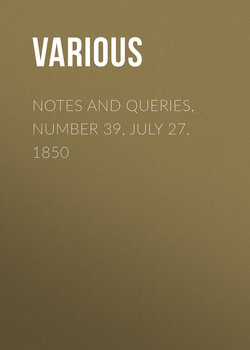Notes and Queries, Number 39, July 27, 1850

Реклама. ООО «ЛитРес», ИНН: 7719571260.
Оглавление
Various. Notes and Queries, Number 39, July 27, 1850
NOTES
ETYMOLOGY OF "WHITSUNTIDE" AND "MASS"
FOLK LORE
LONG MEG OF WESTMINSTER
A NOTE ON SPELLING.—"SANATORY," "CONNECTION."
Minor Notes
QUERIES
THE STORY OF THE THREE MEN AND THEIR BAG OF MONEY
THE GEOMETRICAL FOOT
Minor Queries
REPLIES
A TREATISE ON EQUIVOCATION
FURTHER NOTES ON THE DERIVATION OF THE WORD "NEWS."
"NEWS," "NOISE," AND "PARLIAMENT."
SHAKSPEARE'S USE OF THE WORD "DELIGHTED."
REPLIES TO MINOR QUERIES
MISCELLANEOUS
NOTES ON BOOKS, SALES, CATALOGUES, ETC
BOOKS AND ODD VOLUMES
NOTICES TO CORRESPONDENTS
Отрывок из книги
Perhaps the following Note and Query on the much-disputed origin of the word Whitsunday, as used in our Liturgy, may find a place in your Journal. None of the etymologies of this word at present in vogue is at all satisfactory. They are—
I. White Sunday: and this, either—
.....
1. Versteran's explanation:—That it is Wied Sunday, i.e. Sacred Sunday (from Saxon, wied, or wihed, a word I do not find in Bosworth's A.-S. Dict.; but so written in Brady's Clovis Calendaria, as below). But why should this day be distinguished as sacred beyond all other Sundays in the year?
2. In Clavis Calendaria, by John Brady (2 vols. 8vo. 1815), I find, vol. i. p. 378., "Other authorities contend," he does not say who those authorities are, "that the original name of this season of the year was Wittentide; or the time of choosing the wits, or wise men, to the Wittenagemote."
.....